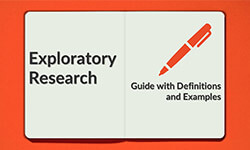
Exploratory research deals with undiscovered or unfamiliar issues, frequently making up the foundation for further structured research. Within research methodology, it can be identified by its open-ended and flexible approach with the goal to explore new horizons, create ideas, or bringing clarity to debatable topics. Exploratory research does not test hypotheses but rather asks questions and collects first data, where further valuable and more in-depth investigations can be conducted.
Definition: Exploratory research
Exploratory research is a study methodology that explores an issue that has not been extensively studied in the past or a new topic or subject. It explores specific elements of an existing phenomenon and gets more insight into it.
The usage of exploratory research
This method is often applied when the study issue is novel or when the data collection process for the study issue is challenging. You can also use this method if you have a general notion about a subject or a specific question that you would like to explore, but there is no existing knowledge with which to explore it.
Exploratory research questions
Academic studies usually begin with research questions. These questions are usually constructed to assist you to understand more about a particular subject. Therefore, they help you put together notions to master the footing of your investigation without adding any predetermined philosophies or assumptions.
Exploratory research data collection
Data collection in this form of research is challenging because it involves working with a previously unexplored subject. However, exploratory research allows you to narrow down your subject of interest and come up with a distinct premise and problem statement.
You can use primary and secondary research questions to gather data. Primary research collects data directly from primary sources. Some examples of these sources are:
- Survey
- Focus groups
- Interviews
On the other hand, secondary research collects data from existing materials. Examples of secondary research data collection techniques are:
- Case studies
- Literature review
- Interviews
- Online polls
- Blog posts
- Surveys
The five steps of exploratory research with examples
The way you conduct this research usually depends on your chosen data collection method. However, this research features five standard steps.
Step 1 of exploratory research: Problem identification
The first step is narrowing down the problem and determining if using an exploratory study is an ideal course of action.
Step 2 of exploratory research: Hypothesize a solution
The next step is establishing a solution to the challenge you are investigating. This involves articulating a hypothetical statement that will guide your study.
Step 3 of exploratory research: Methodology design
This is where you conceptualize your data collection and analysis techniques and use them to develop a research design.
Step 4 of exploratory research: Data collection and analysis
Now you collect and analyze your data from the third step. Next, you can decide if your pilot results support your hypothesis. This research technique allows you to change your hypothesis depending on your findings.
Step 5 of exploratory research: Avenues for future research
At this stage, you can determine if you would like to pursue the topic further. If you choose to do so, you will need to switch to another research design, like quantitative research with a larger sample size. Note that exploratory research does not usually give conclusive or generalizable results.
Exploratory vs. explanatory research
Exploratory research explores research questions that have not been studied extensively in the past. The preliminary outcomes form the foundation for future explorations of the subject. In contrast, explanatory research questions focus on the ‘whys’ and ‘hows’.
Advantages vs. disadvantages
Here are the pros and cons of exploratory research:
| ✔ Pros | ✘ Cons |
|
|
|
|
|
|
FAQs
This form of research seeks to explore a topic that has not been previously studied in-depth. Its results form the foundation for further studies.
It is easy to conduct and gives more insight into an unexplored issue. It guides further studies on the subject.
Exploratory research is a study methodology that explores an issue that has not been extensively studied in the past or a new topic or subject.
It features five steps: problem identification, hypothesizing, research design, data collection and analysis, and further research.
